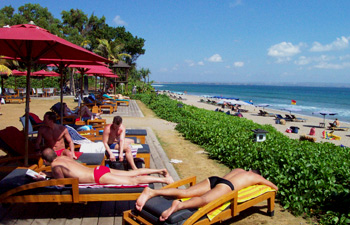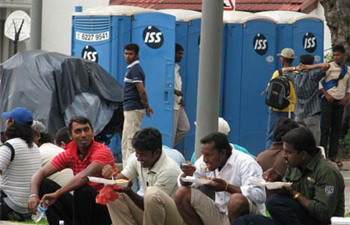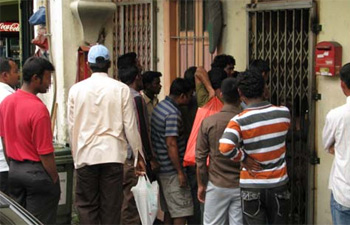In Entrapment and implied consent of police decoys, the ethical issues surrounding entrapment were discussed. This was in relation to the arrest of a Malaysian for cruising an undercover police officer who stationed himself in a well-known cruising ground off Victoria Street.
Outside of entrapment, the other problem that I have with the police operation is what I’d call the enforcement of homogeneity. The concept is like this: In real life, our behavioural landscape is never homogeneous. We humans are very good at reading customary norms for a particular time and place and we tailor our own behaviour accordingly when we find ourselves inserted into such situations. We shift registers in our language use depending on situational context. We don’t munch popcorn and potato chips in places of worship, even though we might do that in a cinema. How we dress and expect others to dress on a beach is very different from in a concert hall. It is acceptable to strip off one’s underwear in a locker room in full view of others when it is not at a clothes shop.

Every space has its conventions, which may even vary by the hour; for example, people around you are more indulgent if you’re tipsy and over-impulsive in a pub at 2 am than at 2 pm. How these conventions come about is almost totally evolutionary. Only in very specific situations, e.g. dress code in a concert hall, is it (sometimes) specified and policed.
And so different nooks and crannies of any city have different behavioural conventions inscribed on them, and we know it. Even if we’re new to a place and thus did not know beforehand, as a social animal we are very good at reading the cues once we notice other people and we generally respect the prevailing convention.
It is the person who demands that his standard should override the established convention whom we see as the troublemaker. We think it is absurd to demand that comedy clubs eschew ribald humour, that people should wear ballgrowns to the beach or that shoppers should stop talking and observe silence just because a cultural group has been parachuted into a shopping centre atrium to play music. If anybody demands that his standard of propriety be applied over the established convention, we ask: What’s his agenda?
Imposing a homogeneity of behaviour on all places is absurd; it would run counter to the human use of spaces. Moreover, it is impossible to police behaviour everywhere. Thus, any policing must necessarily be highly selective, both as to where and as to what standard to enforce. But selectivity is the breeding ground for discrimination. At a herd level, it is most commonly seen in the enforcement of class stratification, when insiders demand adherence to certain norms of behaviour, for no rational reason than to exclude those whose background does not equip them with the same manners. At the level of the state, sexual policing is more frequently seen.
More specifically, my argument about the cruising ground that was the scene of the arrest is this: It is an old, disused cemetery. In daylight hours, men who live in surrounding tenements us it as a park to relax in and socialise — I know that because I walked through it, taking pictures of people when I was doing my photo essay on the Bugis district. After nightfall, it becomes an area for a different kind of socialising — homosexual, bisexual and even heterosexual men cruising for sexual relief. It’s been known as a cruising ground for years. Nobody else would walk through the cemetery at night; it doesn’t provide a shortcut anywhere. In other words, a convention has developed over the years that this is a place where cruising takes place after dark and if you accidentally find yourself there and are approached, you may excuse yourself, but you don’t demand that your personal idea of propriety should override the social convention that has been in place for a long time.
So why is the police suddenly doing that? Why, as a matter of comparison do they not mount entrapment operations in other green areas that have a reputation for opposite-sex couples making out at night? Why aren’t there constables male and female standing inside and outside Orchard Towers with handcuffs at the ready, while waiting to be propositioned?
My point is this: Leave that cruising ground alone. It disturbs no one, and all who participate do so consensually. The same people who look for sex in there would know to behave quite respectably once they walk out of its confines. To enforce the standards of the shopping belt on a cruising ground is to demand that certain activities inappropriate for the shopping belt must never be permitted anywhere; it is to confine our own humanness to prescribed actions and desires, leaving no space or legitimacy to any other. We reduce ourselves to uni-functional robots.
I know the retort. It goes like this: It’s a public space, the standards of a public space must apply. Sex is not unpermitted (the continued life of Section 377A that criminalises gay male sex notwithstanding); it’s just that it should be done in private.
Reality is not as neat as that. I’ve already argued that it is simplistic to speak of a single standard for public spaces: They vary. I would also argue that there is no clear line between public and private. Usage makes a huge difference. Is a lockable lavatory in a shopping mall a private or public space? Is the inside of a van a private or public space? Is the balcony of your flat a private or public space? The greyness of the public/private boundary and of standards make simple maxims problematic.
* * * * *
My next point is: What if, for certain socio-economic classes, there is no private space they can call their own? By enforcing the morality of the middle-class, who have the benefit of private spaces to indulge in their hypocrisy, on the poorer off, is this not class discrimination? Is this not a violation of human rights when what the middle-class consider essential to their being is effectively denied to others?
You see, that cruising ground off Victoria Street mostly serves our migrant workers from India and Bangladesh. These are people who live in dormitories, six or twelve to a room, each with little more than a bunk bed and a lockable box to call their own. They are here in Singapore for two years or more at a time. You expect them never to have sexual relief all this while? How many middle-class people would agree to be denied sex, even masturbation, for years on end?
So where are these men going to get sexual relief, if they have no private spaces? In public of course. And if they have the sense to do it in a secluded area, we should thank them for their consideration rather than arrest them.
Look at the photo below. What you see are migrant workers using a public space — a parking lot — as a socialising arena and dining room. But look behind them, at the portaloos. The authorities have taken the trouble to provide because we know that if we don’t, people will urinate and defecate at random. Being essential bodily functions, we know we can’t say “Don’t do it.” So we come up with money to provide.

Should we therefore provide little cabins where migrant workers can have sex too? The principle’s the same as providing toilets. Except that if they have evolved a practice of doing sex in a secluded park after dark concealed by thick foliage, it costs our public purse nothing. Shouldn’t we be grateful for that? Why don’t we just leave them alone rather than spend money sending police decoys in to entrap them?
* * * * *
I have one more picture as a parting shot. This was taken along Rowell Road in Little India in broad daylight (two faces have been pixelated).

The migrant workers from India are looking at and possibly negotiating with one or two women inside the gated stairway. At a few other stairways, other groups of men are gathered. The women offer sex. For money. This along a street where quite a few other people, including children, walk past.
(Other times, the women — sometimes transsexuals — are out on the sidewalk.)
But we know this is Rowell Road, parallel to Desker Road. Both streets have a long history of housing brothels and we accept that this is part of the variegated nature of a city’s topography. Why is this tolerated when what we cannot ordinarily see — hidden in the bush after nightfall — is not?
Alex Au has been a gay activist and social commentator for 14 years and is the co-founder of People Like Us, Singapore. Alex is the author of the well-known Yawning Bread website.
